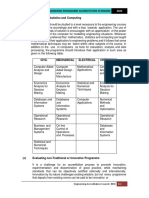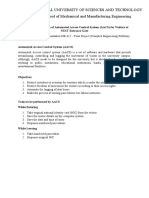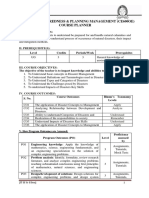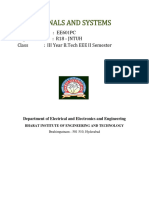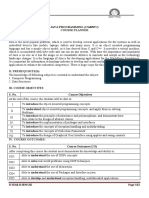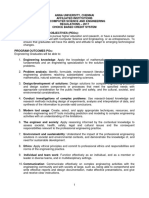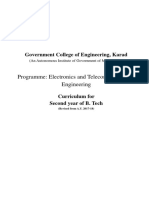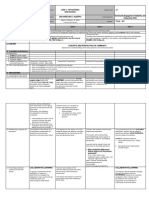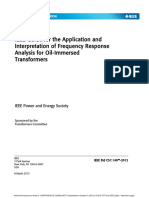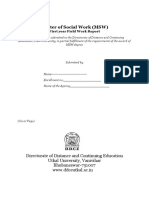0 ratings0% found this document useful (0 votes)
41 viewsCEP and EA Attributes
CEP and EA Attributes
Uploaded by
Raees AhmedThe document defines and provides attributes of complex problems and complex engineering activities. Complex problems are engineering problems that cannot be solved without in-depth knowledge, involve conflicting requirements, require abstract thinking and extensive analysis and knowledge, and have high stakes and consequences. Complex engineering activities similarly involve resolving interactions between diverse issues, using innovation and research-based knowledge to solve problems with significant consequences.
Copyright:
© All Rights Reserved
Available Formats
Download as DOCX, PDF, TXT or read online from Scribd
CEP and EA Attributes
CEP and EA Attributes
Uploaded by
Raees Ahmed0 ratings0% found this document useful (0 votes)
41 views2 pagesThe document defines and provides attributes of complex problems and complex engineering activities. Complex problems are engineering problems that cannot be solved without in-depth knowledge, involve conflicting requirements, require abstract thinking and extensive analysis and knowledge, and have high stakes and consequences. Complex engineering activities similarly involve resolving interactions between diverse issues, using innovation and research-based knowledge to solve problems with significant consequences.
Original Description:
Attributes of Complex Engineering Problems and Complex Engineering Activities according to ABET
Copyright
© © All Rights Reserved
Available Formats
DOCX, PDF, TXT or read online from Scribd
Share this document
Did you find this document useful?
Is this content inappropriate?
The document defines and provides attributes of complex problems and complex engineering activities. Complex problems are engineering problems that cannot be solved without in-depth knowledge, involve conflicting requirements, require abstract thinking and extensive analysis and knowledge, and have high stakes and consequences. Complex engineering activities similarly involve resolving interactions between diverse issues, using innovation and research-based knowledge to solve problems with significant consequences.
Copyright:
© All Rights Reserved
Available Formats
Download as DOCX, PDF, TXT or read online from Scribd
Download as docx, pdf, or txt
0 ratings0% found this document useful (0 votes)
41 views2 pagesCEP and EA Attributes
CEP and EA Attributes
Uploaded by
Raees AhmedThe document defines and provides attributes of complex problems and complex engineering activities. Complex problems are engineering problems that cannot be solved without in-depth knowledge, involve conflicting requirements, require abstract thinking and extensive analysis and knowledge, and have high stakes and consequences. Complex engineering activities similarly involve resolving interactions between diverse issues, using innovation and research-based knowledge to solve problems with significant consequences.
Copyright:
© All Rights Reserved
Available Formats
Download as DOCX, PDF, TXT or read online from Scribd
Download as docx, pdf, or txt
You are on page 1of 2
Table 1: Range of Complex Problem Solving
Attribute Complex Problems
Engineering problems which cannot be resolved
W
Preamble without in-depth engineering knowledge, and have
P1
some or all of the characteristics listed below:
W Range of conflicting Involve wide-ranging or conflicting technical,
P2 requirements engineering and other issues.
Have no obvious solution and require abstract
W Depth of analysis
thinking, originality in analysis to formulate suitable
P3 required
models.
Requires research-based knowledge much of which is
W Depth of knowledge at, or informed by, the forefront of the professional
P4 required discipline and which allows a fundamentals-based,
first principles analytical approach.
W
Familiarity of issues Involve infrequently encountered issues
P5
W Extent of applicable Are outside problems encompassed by standards and
P6 codes codes of practice for professional engineering.
Extent of stakeholder Involve diverse groups of stakeholders with widely
W involvement and level varying needs.
P7 of conflicting
requirements
W Have significant consequences in a range of contexts.
Consequences
P8
W Are high level problems including many component
Interdependence
P9 parts or sub-problems.
Table 2: Range of Complex Engineering Activities
Attribute Complex Activities
Complex activities means(engineering) activities
EA1 Preamble or projects that have some or all of the following
characteristics listed below:
Involve the use of diverse resources (and for this
purpose, resources include people, money,
EA2 Range of resources
equipment, materials, information and
technologies).
Require resolution of significant problems arising
EA3 Level of Interaction from interactions between wide-ranging or
conflicting technical, engineering or other issues.
Involve creative use of engineering principles and
EA4 Innovation
research-based knowledge in novel ways.
EA5 Consequences to Have significant consequences in a range of
society and the contexts, characterized by difficulty of prediction
environment
and mitigation.
Can extend beyond previous experiences by
EA6 Familiarity
applying principles-based approaches.
You might also like
- Q & As for the PMBOK® Guide Sixth EditionFrom EverandQ & As for the PMBOK® Guide Sixth EditionRating: 4.5 out of 5 stars4.5/5 (18)
- Lab ManualDocument63 pagesLab ManualS.SujathaNo ratings yet
- Complex Engineering Problems (Mapping)Document1 pageComplex Engineering Problems (Mapping)Faraz HumayunNo ratings yet
- Xbar and R - Xbar and S Charts - X and MR Charts - Coursera (OK)Document18 pagesXbar and R - Xbar and S Charts - X and MR Charts - Coursera (OK)nguyenvandongNo ratings yet
- Engineering Programme Accreditation Cps Cea Knowledge ProfileDocument3 pagesEngineering Programme Accreditation Cps Cea Knowledge ProfileekmemonNo ratings yet
- Eac Standard 2020 On WK WP EaDocument7 pagesEac Standard 2020 On WK WP EaHafiziAhmadNo ratings yet
- Complexity Level EAC Definition - 2017Document3 pagesComplexity Level EAC Definition - 2017ema8072No ratings yet
- ProposalDocument4 pagesProposalABIZ TVNo ratings yet
- AttributesDocument2 pagesAttributesAli BahuNo ratings yet
- SAR Annexures TemplateDocument17 pagesSAR Annexures TemplateQadeer MalikNo ratings yet
- Annexure III - EnV-440 - EnvEngg - CEP - Design - 2024Document2 pagesAnnexure III - EnV-440 - EnvEngg - CEP - Design - 2024Samiullah M QaisraniNo ratings yet
- WK WP EA ListDocument4 pagesWK WP EA ListAzzril HashimNo ratings yet
- EEE Indicators V20Document19 pagesEEE Indicators V20tanzeer evanNo ratings yet
- Lab - 9: Load Flow Analysis of Any Power System.: ObjectivesDocument2 pagesLab - 9: Load Flow Analysis of Any Power System.: ObjectivesIftikhar AhmadNo ratings yet
- Mini Project With Coverpage - S2 2023-All SignedDocument7 pagesMini Project With Coverpage - S2 2023-All SignedImran ZikriNo ratings yet
- Range of Problem Solving (DP) : in The Context of Both Graduate Attributes and Professional CompetenciesDocument3 pagesRange of Problem Solving (DP) : in The Context of Both Graduate Attributes and Professional Competenciesiot projectNo ratings yet
- Iv HveDocument18 pagesIv HvenorthpagalNo ratings yet
- EEE-EDS Imp QuesDocument17 pagesEEE-EDS Imp QuesThejeshwi ReddyNo ratings yet
- Operating Systems LAB MANUAL T.E. I.T. 2024-25Document75 pagesOperating Systems LAB MANUAL T.E. I.T. 2024-25yepiwoh314No ratings yet
- Gap Analysis: Megat Johari Megat Mohd NoorDocument24 pagesGap Analysis: Megat Johari Megat Mohd NoorumairNo ratings yet
- Ii LTNMCDocument21 pagesIi LTNMCAAKANKSHANo ratings yet
- Complex Engineering Problem PDFDocument10 pagesComplex Engineering Problem PDFMohsin BashirNo ratings yet
- UTEM OBE Assessment CQI WKSH May28 2014Document184 pagesUTEM OBE Assessment CQI WKSH May28 2014asriiNo ratings yet
- EE21 Course SyallabusDocument5 pagesEE21 Course SyallabusMary ViolagoNo ratings yet
- DBMS Lab Manual 2023-24Document77 pagesDBMS Lab Manual 2023-24Shaurya NikamNo ratings yet
- Competency Standard For Registration As A Professional EngineerDocument5 pagesCompetency Standard For Registration As A Professional Engineermnazzal2010No ratings yet
- Iii - Ii It DPPMDocument20 pagesIii - Ii It DPPMBalajiNo ratings yet
- Department of Electronics PoDocument1 pageDepartment of Electronics PotusharNo ratings yet
- III Signals&SystemDocument19 pagesIII Signals&SystemphanindervinayNo ratings yet
- It JavaDocument21 pagesIt JavaSalma FarozeNo ratings yet
- Outcome Based EducationDocument187 pagesOutcome Based EducationchinchouNo ratings yet
- Ug Cse Co With SyllabusDocument173 pagesUg Cse Co With Syllabuscsetiet csetietNo ratings yet
- Group Project - ECM566 - Oct2022 - SitiRashidah - Draft1Document9 pagesGroup Project - ECM566 - Oct2022 - SitiRashidah - Draft1Faiz SyazwanNo ratings yet
- Eee Iv HveDocument16 pagesEee Iv Hveanwar.23enp30No ratings yet
- 01.b.e. Cse Syllabus PDFDocument125 pages01.b.e. Cse Syllabus PDFAsst.Prof S&HNo ratings yet
- 2017 Curriculum CSE Full PDFDocument180 pages2017 Curriculum CSE Full PDFRethyNo ratings yet
- 209 - 2017 Regulation SyllabusDocument670 pages209 - 2017 Regulation Syllabussivakumar0% (1)
- Cse MFCSDocument17 pagesCse MFCSbgangabhavaniitNo ratings yet
- Instrumentation Design EngineeringDocument10 pagesInstrumentation Design EngineeringsalemNo ratings yet
- Laboratory 1 - LightingDocument7 pagesLaboratory 1 - LightingAzmi HashimNo ratings yet
- Fundamentals of Management For EngineersDocument32 pagesFundamentals of Management For Engineersharjitjassar61No ratings yet
- Rubrics For Interim Report, Presentation, Final Report, Video Montage - 29mar2021Document21 pagesRubrics For Interim Report, Presentation, Final Report, Video Montage - 29mar2021farhanaNo ratings yet
- Programme: Electronics and Telecommunication Engineering: Government College of Engineering, KaradDocument49 pagesProgramme: Electronics and Telecommunication Engineering: Government College of Engineering, KaradPratik TelangNo ratings yet
- GET 402-CEP in Experiential Learning Lecture 1-Identifying and Reporting CEPDocument54 pagesGET 402-CEP in Experiential Learning Lecture 1-Identifying and Reporting CEPotibhor.ikuenobeNo ratings yet
- Business Economic and Financial AnalysisDocument26 pagesBusiness Economic and Financial AnalysisSreeja BobbiliNo ratings yet
- 2017 Cse-SyllabusDocument164 pages2017 Cse-SyllabusrubyshiagNo ratings yet
- WORKSHOP CEP-CEA-OEL Jan 2022 Ver 2Document56 pagesWORKSHOP CEP-CEA-OEL Jan 2022 Ver 2Kashif MuhammadNo ratings yet
- NATE - NBA Module 1 - Week2Document18 pagesNATE - NBA Module 1 - Week2Santosh KumarNo ratings yet
- BE B.tech ECE R22A I VII Semester Syllabus 2024 25Document263 pagesBE B.tech ECE R22A I VII Semester Syllabus 2024 25pragati.gupta7785No ratings yet
- SE LAB ManualDocument80 pagesSE LAB ManualAkula Lakshmi SreenivasuluNo ratings yet
- Estimating and Costing: Subject Code: A70138 Regulations: R15 - JNTUH Class: IV Year B.Tech CE I SemesterDocument18 pagesEstimating and Costing: Subject Code: A70138 Regulations: R15 - JNTUH Class: IV Year B.Tech CE I SemesterMazi ParaNo ratings yet
- (Latest) Lab 2 - BPB16003Document15 pages(Latest) Lab 2 - BPB16003syiraa kimNo ratings yet
- Ii-I Ece - Edc - Ec301pcDocument27 pagesIi-I Ece - Edc - Ec301pcbaburao lankapalliNo ratings yet
- PQF L5 Diploma Workshop Presentation-KITDocument32 pagesPQF L5 Diploma Workshop Presentation-KITYolynne MedinaNo ratings yet
- Iii Cse PPL Lesson PlanDocument17 pagesIii Cse PPL Lesson PlanarchanaNo ratings yet
- Distributed SystemsDocument15 pagesDistributed SystemsRahul TaldaNo ratings yet
- Zero LectureDocument28 pagesZero LectureRam BaghelNo ratings yet
- Iii PSPDocument21 pagesIii PSPDr. Md. Salah Uddin YusufNo ratings yet
- ECC589: ENGINEERS IN SOCIETY (Service-Learning Malaysia University For Society - SULAM)Document18 pagesECC589: ENGINEERS IN SOCIETY (Service-Learning Malaysia University For Society - SULAM)2021474354No ratings yet
- Project Management Nation: Tools, Techniques, and Goals for the New and Practicing IT Project ManagerFrom EverandProject Management Nation: Tools, Techniques, and Goals for the New and Practicing IT Project ManagerRating: 1 out of 5 stars1/5 (1)
- Chemical Equilibria OutlinesDocument1 pageChemical Equilibria OutlinesOluwabusolami AkinolaNo ratings yet
- CSC Week 1 DLL PDFDocument5 pagesCSC Week 1 DLL PDFicoa31No ratings yet
- Learning Team Aet562 - Self-Guided Social Media Training ManualDocument18 pagesLearning Team Aet562 - Self-Guided Social Media Training Manualapi-646128900No ratings yet
- 6.2 Brief Analysis of Saint Martin: HistoryDocument6 pages6.2 Brief Analysis of Saint Martin: Historyafiq sergioNo ratings yet
- SEM 3-Week 03 Task Assignment My Life AchievementsDocument2 pagesSEM 3-Week 03 Task Assignment My Life AchievementsSergio Niquen BcsNo ratings yet
- Stevenson Chapter 3 - Forecasting-1-1-1Document58 pagesStevenson Chapter 3 - Forecasting-1-1-1Sadman Sakib TazwarNo ratings yet
- 19 OnScreen C1 Test 1Document4 pages19 OnScreen C1 Test 1Христо ДаневNo ratings yet
- C57.149 Guide For The Application and Interpretation of Frequency Response Analysis For Oil-Immersed TransformersDocument72 pagesC57.149 Guide For The Application and Interpretation of Frequency Response Analysis For Oil-Immersed TransformersLigaiFut San Andrés DE SotaventoNo ratings yet
- Natural Science - WikipediaDocument25 pagesNatural Science - WikipediaDamilare Daniel OlaniyiNo ratings yet
- CV Ibrahim Basar Aka March 2024Document4 pagesCV Ibrahim Basar Aka March 2024Onur FerhanogluNo ratings yet
- Chapter 1-Introduction To Process SafetyDocument59 pagesChapter 1-Introduction To Process SafetyDhayalan RamachandranNo ratings yet
- FREE Think and Grow Rich Chapter 1Document50 pagesFREE Think and Grow Rich Chapter 1Joanna Tan50% (2)
- Information:: YellowDocument5 pagesInformation:: YellowAkhosh KrishnaNo ratings yet
- BPS Question BankDocument6 pagesBPS Question Bankthegamepalace10No ratings yet
- Bipolar Worksheet - 19 - Problem Solving SheetDocument2 pagesBipolar Worksheet - 19 - Problem Solving SheetmaleskunNo ratings yet
- Progress Report Progress Report Is Written To Elaborate The Progress of Something (Project, Task, Assignment Etc.) FeaturesDocument3 pagesProgress Report Progress Report Is Written To Elaborate The Progress of Something (Project, Task, Assignment Etc.) FeaturesWaile NaeemNo ratings yet
- Newton's Law of Motion (Obsevations)Document6 pagesNewton's Law of Motion (Obsevations)Jem GuicoNo ratings yet
- NCM 100j - ReviewerDocument5 pagesNCM 100j - ReviewerRAIANA MANIPOLNo ratings yet
- Personal Essay - EditedDocument3 pagesPersonal Essay - EditedAlex WafulaNo ratings yet
- Michael Gane - Forest Strategy - Strategic Management and Sustainable Development For The Forest Sector (2007)Document422 pagesMichael Gane - Forest Strategy - Strategic Management and Sustainable Development For The Forest Sector (2007)Yanny ManggugubatNo ratings yet
- SGDS Sigma III Yaskawa Manual-1 PDFDocument688 pagesSGDS Sigma III Yaskawa Manual-1 PDFIndustrial Automation TD120% (1)
- KDS 11 70 05 Banking and Cutting Design StandardsDocument28 pagesKDS 11 70 05 Banking and Cutting Design StandardsSH Big ShimNo ratings yet
- Practical C++Document30 pagesPractical C++HarmanNo ratings yet
- Joao Capistrano de Abreu - Chapters of Brazil's Colonial History 1500-1800 (Library of Latin America) - Oxford University Press, USA (1998)Document271 pagesJoao Capistrano de Abreu - Chapters of Brazil's Colonial History 1500-1800 (Library of Latin America) - Oxford University Press, USA (1998)Israel Leite100% (1)
- Activity 5 - StarbucksDocument6 pagesActivity 5 - StarbucksLeokimNo ratings yet
- PerDev Q2 Mod1 Dynamics of Attraction and Love v5Document20 pagesPerDev Q2 Mod1 Dynamics of Attraction and Love v5VillaErnestNo ratings yet
- Technical Description: Technical Overview - Lube Oil SystemDocument10 pagesTechnical Description: Technical Overview - Lube Oil SystemDenNo ratings yet
- Literature MapDocument1 pageLiterature MapLovely PanzNo ratings yet
- MSW Project GuidelinesDocument3 pagesMSW Project GuidelinesTapan Kumar ParidaNo ratings yet











